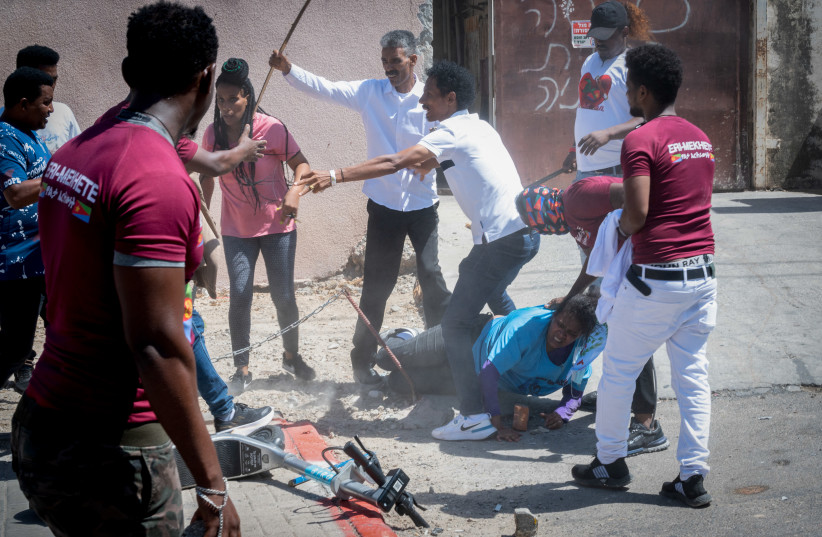Eritrean asylum seeker clashes are unacceptable – don’t make them worse – editorial
The scene resembled an urban battlefield, according to eyewitness reports. On Saturday, hundreds of men armed with sticks, rocks, bottles, and other improvised weapons descended on a hall in south Tel Aviv where the Eritrean embassy was hosting an event marking Revolution Day, which commemorates the start of the Eritrean War of Independence against Ethiopia in 1961.
At least 160 people were injured in consequent clashes between supporters and opponents of the Eritrean government as the regime’s opponents tried for hours to prevent the event from going ahead. Some 50 police officers were wounded in the violence.
Police Commissioner Kobi Shabtai said officers were forced to use stun grenades and live fire when they came under attack. The Justice Ministry’s Police Investigations Unit has launched an inquiry into the police handling of the violence.
Local businesses were burned and looted, residents were trapped in their homes unable to risk going out, and public property was destroyed.
This was not a spontaneous riot. Both the opponents and the regime supporters were dressed for the protests, wearing blue and red T-shirts, respectively. Last week, an organization representing Eritrean asylum seekers had warned the police of likely bloodshed and urged that the event not be granted approval to go ahead. The anti-regime protesters claim that the Eritrean embassy, representing the government of President Isaias Afwerki, is spying on those who fled the dictatorship and are seeking asylum abroad.
 Eritrean asylum seekers who oppose the regime in Eritrea and pro regime activists clash with Israeli police in south Tel Aviv, September 2, 2023. (credit: Omer Fichman/Flash90)
Eritrean asylum seekers who oppose the regime in Eritrea and pro regime activists clash with Israeli police in south Tel Aviv, September 2, 2023. (credit: Omer Fichman/Flash90)How to deal with Eritrean expat clashes
Israel is not the only country that has seen such a clash of different forces. Last month, German police were forced to use riot control tactics when hundreds of anti-regime protesters descended on an Eritrean cultural festival in the town of Giessen. Nearly 100 protesters were arrested by the German authorities during the violence, in which more than 25 police officers were injured. A similar scene played out in Holland. Other places with large numbers of Eritrean asylum seekers, including the US and Canada, banned similar events for fear of riots.
About 25,500 Eritrean asylum seekers currently live in Israel, according to ASSAF, an organization that aids refugees. The government considers the vast majority of them to be illegal migrants as they entered the country by infiltration, most of them via the Egyptian border in Sinai before the Israeli government erected a fence, completed in 2014, to block the wave of infiltrators from Africa.
Prime Minister Benjamin Netanyahu yesterday urgently convened a special ministerial task force to evaluate ways to deal with the violent Eritrean protesters. Netanyahu said Saturday’s disturbances “crossed a red line” and could not be tolerated.
According to a statement released after the meeting, among the steps the panel is considering is the immediate expulsion of those who took part.
Netanyahu said: “It is hard for me to understand why we would have a problem with those who declare that they support the regime; they certainly cannot claim refugee status.”
The prime minister added: “I would also like this forum to prepare a complete and updated plan to repatriate all of the remaining illegal infiltrators from the State of Israel.”
Such a move is not easy and has many diplomatic, legal, and domestic ramifications.
At a time when tensions within Israeli society are particularly strained over the judicial reform and the protest movement, the intra-Eritrean violence naturally was seen in the context of this divide.
Much of the impetus for the government’s proposed reform stems from the High Court’s overturning of Knesset laws designed to handle the issue of illegal migrants – including deportation or imprisonment in the Holot detention center.
The police must examine for itself why it was so unprepared for the level of violence despite early intelligence and the experience from the migrant community and police abroad.
But Netanyahu is correct in saying that the violence is absolutely unacceptable – and ultimately the blame lies with the protesters themselves.
It should be remembered, however, that the majority of migrants in Israel, including members of the Eritrean community, are not seeking violence and every effort must be made to ensure that Saturday’s clashes are not exploited in a way that leads to further lawlessness and chaos.





Comments are closed.